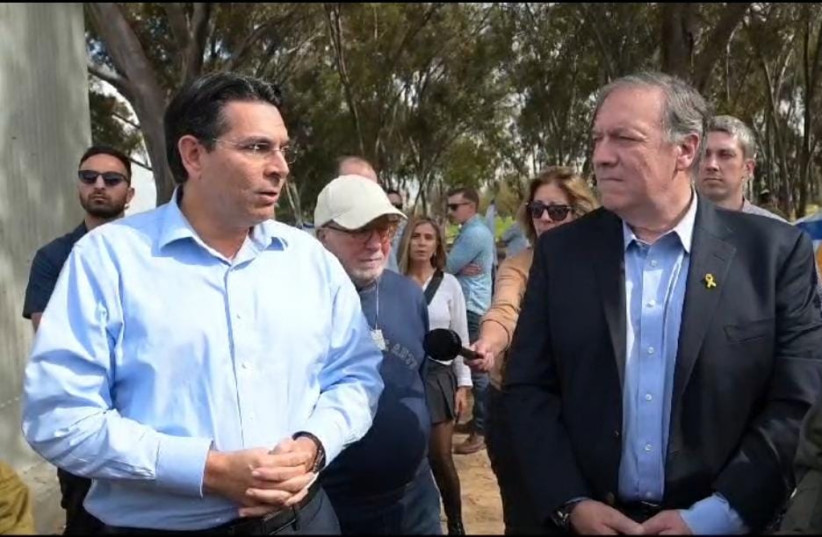The spread of the conflict with Hezbollah is very disturbing to US President Joe Biden.
The US polls predict his defeat in the elections against Donald Trump.
Biden is torn between the necessity to continue supporting Israel until the goals of war are achieved and the fear that continued unreserved support for the Jewish state could cost him the elections.
“We’re going to continue to do what’s necessary to ensure that Israel has the means to defend itself,” Secretary of US Defense Lloyd Austin said as the United States delayed “one shipment of high payload munitions,” explaining it was “currently reviewing some near-term security assistance shipments in the context of unfolding events in Rafah.”
Israel must defend itself
Deputy Speaker of the Knesset MK Rabbi Moshe Roth claimed that the US has never allowed Israel to have “total victory” in any war or military operation. Roth added that the US wants to maintain a military “balance” vis-à-vis the Palestinians and Arab countries by controlling the “faucet” of military aid to Israel.
In a Radios 100 FM interview on The Chosen Ones, MK Danny Danon, a member of the Foreign Affairs and Defense Committee, implicitly threatened the US by saying that if it stopped the supply of precision weapons, Israel would have to use imprecise weapons.

Israel committed the cardinal mistake by not taking advantage of the worldwide support of public opinion on October 7, and not entering Rafah then. Neither Egypt nor the US would then have stopped the seizure of the Philadelphia axis and the Rafah crossing on the Gazan side.
Despite US concerns, almost half a million people have already been evacuated from Rafah to the northern Gaza Strip.
The Washington Post revealed that, in an attempt to stop Israel from entering Rafah, the US had offered to provide Israel with intelligence on the hiding places of senior Hamas officials. If this news is true, then it is nothing less than an attempt at blackmail by our most important ally as Hamas chief Yahya Sinwar and the remnants of the weakened Hamas battalions hide among the Gazan citizens in Rafah, patiently waiting for the US to pull their chestnuts out of the fire.
In reality, they don’t want an agreement and their conditions and demands prove this, unequivocally. The main issues is Sinwar’s demand for a US commitment that the war will end after the second round of hostages is released; in addition to a commitment from Israel to accede to Hamas’s demands for the release of convicted assassins upon request.
It is clear that agreeing to these delusional demands would tie Israel’s hands against exerting pressure on Hamas as the terror group prepares to release only 33 abductees, alive and dead. How many will be alive and how many dead, Hamas will not commit to. It is clear that Israel will not accept these demands.
Palestinian nationalism
THE PALESTINIANS and Hamas, over the years, have turned whining into nationalism and are unable, at this stage, to stop the continued military advance in Rafah. The US president’s decision to delay the delivery of part of the American weapons supply is disappointing, and stands in stark contrast with the president’s previous utterances: Biden claimed, until recently, that the only way to end the war was to return all the hostages and eliminate Hamas.
The hallucinatory belief, gaining momentum in the US, according to which the Palestinian Authority (PA) will rule Gaza the “day after Hamas” completely sidelines the fact that the PA was already there. Their Fatah party members were massacred by Hamas and those who could, fled like rats to the PA territories.
All the polls show that Hamas not only has a strong hold on Gaza but also unequivocal sympathy in Judea and Samaria. The Hamas ideology is the ideology of the Palestinians and over 80% of them support the terror group.
A fascinating recording by former chief of staff, Maj.-Gen. (res.), Aviv Kochavi analyzing Israel’s situation before October 7, explains that he believes that the demonstrations following the legal reform and the call for refusal to serve by IDF officers weakened Israel, and were at the heart of Sinwar’s decision to go to war. According to Kochavi, the outgoing Israeli Military Intelligence head, Maj.-Gen. Haliva, and the head of the Military Intelligence Research Division addressed four letters of warning to the government and to Prime Minister Benjamin Netanyahu, warning that Sinwar was following the internal conflict – and that in his analysis of the situation, Israel had been weakened and this was an opportunity to wage war.
Israel is facing a serious dilemma: Should it expand the war in Rafah without US consent and risk further delay in weapons shipments? Or accept the demand to stop the war outright at this stage? There is no doubt that even if we stop the war now, once the hostage deal takes place, Hamas will again afford us the opportunity to resume and not end it until the elimination of its leaders.
The writer is CEO of Radios 100FM, honorary consul of Nauru, vice dean of the Consular Staff and vice president of the Ambassadors Club.
